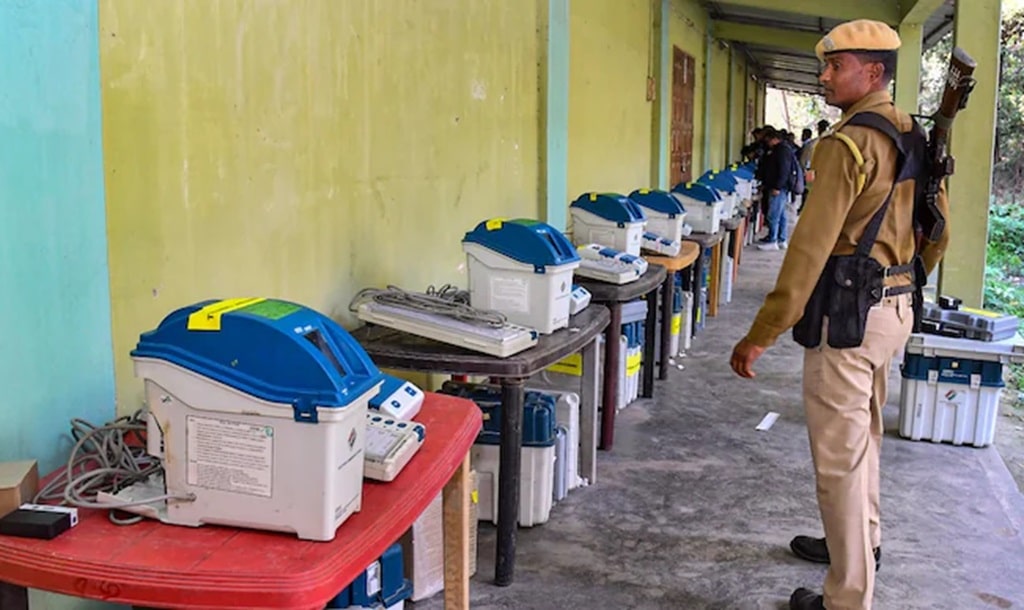Election News
India’s Supreme Court Reserves Decision Over Election Electronic Voting Machines

Election News: The Supreme Court of India reserved its decision on Wednesday, April 24, on the petition regarding the verification of Electronic Voting Machines (EVMs) and Voter Verified Paper Audit Trails (VVPATs), reiterating its position that it lacks authority over election administration, which is the purview of another constitutional body.
The decision comes as phase two of the Lok Sabha Elections 2024 prepares to begin on April 26.
On April 18, a bench of Justices Sanjiv Khanna and Dipankar Datta reserved its verdict on a batch of petitions seeking complete cross-verification of votes cast using EVMs with Voter Verifiable Paper Audit Trail (VVPAT), stating that it needed clarification on certain aspects due to some confusion in the EC’s answers to its ‘frequently asked questions’ (FAQs) on EVMs.
During the hearing, India’s Supreme Court Judge Datta informed attorney Prashant Bhushan that there had been no reports of malicious application loading with the symbol. “Out of the 5% VVPATs counted, any candidate can show if there is any mismatch,” Justice Datta inquired.
“To far, there has been no report of such an incidence (a malicious application being loaded alongside the symbol). We cannot control the election, Mr. Bhushan, or any other constitutional power,” Justice Datta said.
Improving the election voting process
Justice Khanna said, “If there is room for improvement, we can absolutely make it better. The courts intervened twice: once when we ordered the use of VVPAT, and again when we boosted the verification rate from one to five percent.” The Supreme Court further stated that whenever ideas were made to improve the voting process, they always urged for a return to ballot papers.
In its defense, the Election Commission official told the Supreme Court that “each of the three units, CU, BU, and VVPAT, contains its own microcontrollers, securely housed within.” “These microcontrollers are not physically accessible.”
The order came during the Supreme Court’s hearing on a slew of petitions demanding comprehensive cross-verification of votes cast using EVMs.
One of the petitions, the NGO ‘Association for Democratic Reforms’ (ADR), requested that the poll panel reverse its 2017 decision to replace the clear glass on VVPAT machines with opaque glass through which a voter may only view the slip while the light is on for seven seconds.
The petitions also request that voters be given a canopy of the Voter Verifiable Paper Audit Trail (VVPAT) generated by the EVM after each vote.
The VVPAT is an independent vote verification system that allows voters to determine whether their ballots were cast correctly.
Earlier this morning, the Supreme Court bench of Justices Sanjiv Khanna and Dipankar Dutta questioned the functionality of the microcontroller put in the EVMs, the security of the EVMs and VVPATs, and the maximum term for which the machines can be held.
Modi’s Muslim remarks spark ‘hate speech’ accusations as India’s mammoth election deepens divides
India’s Prime Minister Narendra Modi has been accused of making Islamophobic remarks during an election rally on Sunday, inciting considerable outrage among prominent Muslims and members of the opposition.
The world’s most populous country is currently in the midst of a massive weeks-long election in which Modi’s ruling Bharatiya Janata Party (BJP) is widely projected to win a rare third straight term.
Speaking to a large crowd in the country’s western Rajasthan state, Modi stated that if elected, the country’s main opposition, the Indian National Congress, would distribute the country’s wealth among “infiltrators” and “those who have more children,” a clear reference to the Muslim community.
“When they (the Congress) were in control, they said Muslims had first priority over resources. They will collect all of your riches and distribute it to those with more children. “They will distribute among infiltrators,” Modi added to thunderous applause from the gathering.
“Do you think your hard-earned money should go to infiltrators? Will you accept this?” Modi stated.
The opposition has seized on Modi’s words, accusing him and the BJP of adopting divisive rhetoric to fuel their increasingly popular brand of Hindu nationalism. Opposition lawmakers have urged the Election Commission of India (ECI) to investigate whether Modi’s remarks violated the body’s code of conduct.
The code specifies that politicians cannot appeal to voters based on “caste” or “communal feelings.” Activity that “may aggravate differences, create mutual hatred, or cause tension” among communities and religions is likewise prohibited.
Members of the Muslim community have reacted strongly to Modi’s comments, which come at a time when many fear that a third term for the BJP will exacerbate the country’s already profound religious divide.
Disney Is Trying To Salvage Its Indian Dreams